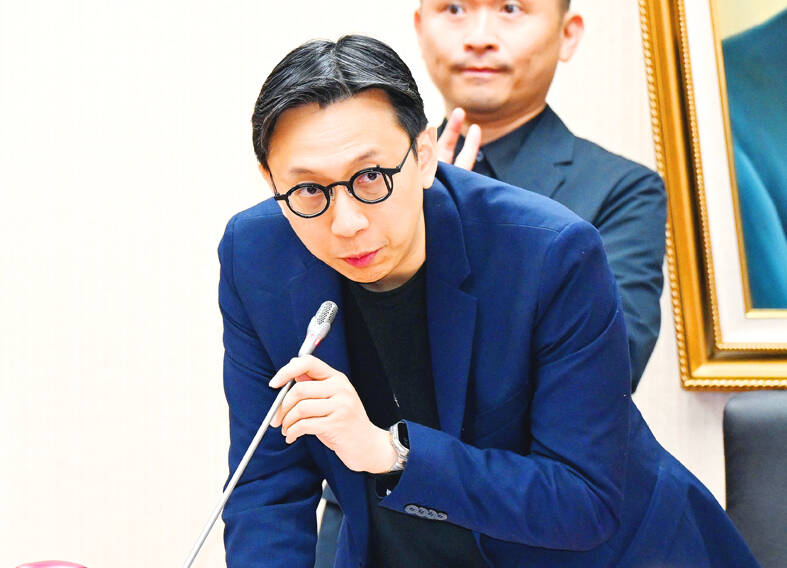Experts yesterday urged lawmakers to facilitate the development of a generative artificial intelligence (AI) system that utilizes Taiwan-centric Chinese language content amid a push to pass tech-friendly copyright laws.
Academics and industry insiders made the comment at a joint hearing on proposals to craft an AI basic law held by the Legislative Yuan’s Education and Culture Committee and Transportation Committee.
The committees were considering clashing initiatives to pass an AI basic law spearheaded by the Ministry of Digital Affairs and Chinese Nationalist Party (KMT) lawmakers Chiu Jo-Hua (邱若華) and Ko Ju-chun (葛如鈞).

Photo: Liao Cheng-hui, Taipei Times
Government leadership is required in the industry-wide effort to develop large-language models that focus on content written in traditional Chinese characters, Institute for Information Industry researcher Hung Yu-shiang (洪毓祥) said.
Officials could provide valuable assistance in promoting public-private collaborations to create a workforce for the AI sector, and craft a legal framework to regulate the industry’s use of data and privacy standards, he said.
EU member states could serve as a model for Taiwan’s emulation, he said.
Caroline Lin (林志潔), a professor of technology law at National Yang Ming Chiao Tung University, said the bills being presented failed to address concerns over Taiwan’s AI sovereignty.
The algorithms currently available too often produce content nominally written in traditional Chinese characters, but make use of syntax and phrases derived from Chinese-style Mandarin, not that of Taiwan’s, she said.
Lawmakers and officials must understand policies concerning the AI industry have national security and geopolitical ramifications, and are not a simple matter of boosting the economy, Lin said.
MeetTomorrow Inc cofounder Hsueh Liang-bin (薛良斌), whose company developed the generative AI MeetAndy, supported Ko’s proposal to create a national AI strategy committee except parts that authorized mayors and county commissioners to participate in the organization.
A national-level mechanism to assess and handle the risks posed by AI systems similar to the ones established by the EU AI Act is needed to protect Taiwan’s economic and national interest, he said.
Deputy Minister of Digital Affairs Yeh Ning (葉寧) said the ministry is not prepared to unveil its proposal at the moment, as the Executive Yuan is still in the process of assessing its requisite funding levels.
Overcoming capability gaps in Taiwan’s AI industry with regard to large language models and creating a legal framework governing fair use of data by developers are the ministry’s main concerns regarding the bill, he said.
Officials are creating a database for traditional Chinese character-based content and a national-level corpus, but it is expected to be time-consuming, he said.
The Ministry of Digital Affairs is additionally cultivating a workforce in collaboration with the National Council of Science and Technology and the Ministry of Education, he said.
The government’s AI development policy is to be guided by digital equality, with an emphasis on infrastructure and applied AI that spread the benefits of technology among all Taiwanese, he said.
Ko acknowledged concerns of the hearing’s participants over AI sovereignty, saying that governmental agencies should play a larger role in creating the databases that would be used to train Taiwanese AIs,
Premier Cho Jung-tai (卓榮泰) is urged to be more active in the legislative and executive branches’ discussions about the proposed AI basic law, he added.

Taiwan has received more than US$70 million in royalties as of the end of last year from developing the F-16V jet as countries worldwide purchase or upgrade to this popular model, government and military officials said on Saturday. Taiwan funded the development of the F-16V jet and ended up the sole investor as other countries withdrew from the program. Now the F-16V is increasingly popular and countries must pay Taiwan a percentage in royalties when they purchase new F-16V aircraft or upgrade older F-16 models. The next five years are expected to be the peak for these royalties, with Taiwan potentially earning

STAY IN YOUR LANE: As the US and Israel attack Iran, the ministry has warned China not to overstep by including Taiwanese citizens in its evacuation orders The Ministry of Foreign Affairs (MOFA) yesterday rebuked a statement by China’s embassy in Israel that it would evacuate Taiwanese holders of Chinese travel documents from Israel amid the latter’s escalating conflict with Iran. Tensions have risen across the Middle East in the wake of US and Israeli airstrikes on Iran beginning Saturday. China subsequently issued an evacuation notice for its citizens. In a news release, the Chinese embassy in Israel said holders of “Taiwan compatriot permits (台胞證)” issued to Taiwanese nationals by Chinese authorities for travel to China — could register for evacuation to Egypt. In Taipei, the ministry yesterday said Taiwan

Taiwan is awaiting official notification from the US regarding the status of the Agreement on Reciprocal Trade (ART) after the US Supreme Court ruled US President Donald Trump's global tariffs unconstitutional. Speaking to reporters before a legislative hearing today, Premier Cho Jung-tai (卓榮泰) said that Taiwan's negotiation team remains focused on ensuring that the bilateral trade deal remains intact despite the legal challenge to Trump's tariff policy. "The US has pledged to notify its trade partners once the subsequent administrative and legal processes are finalized, and that certainly includes Taiwan," Cho said when asked about opposition parties’ doubts that the ART was

If China chose to invade Taiwan tomorrow, it would only have to sever three undersea fiber-optic cable clusters to cause a data blackout, Jason Hsu (許毓仁), a senior fellow at the Hudson Institute and former Chinese Nationalist Party (KMT) legislator, told a US security panel yesterday. In a Taiwan contingency, cable disruption would be one of the earliest preinvasion actions and the signal that escalation had begun, he said, adding that Taiwan’s current cable repair capabilities are insufficient. The US-China Economic and Security Review Commission (USCC) yesterday held a hearing on US-China Competition Under the Sea, with Hsu speaking on